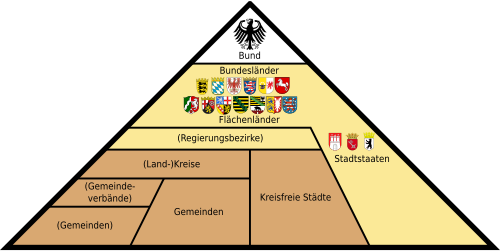City-state
In contrast to an area-wide state , a city- state is a state that only encompasses the area of a city (and possibly its immediate vicinity). It can be a sovereign state or a member state within a federal state .
Cities in unitary states are by no means city-states, even if they are treated as administrative units above the municipal level, since in unitary states, by definition, there are no constituent states. Cities that do not belong to any of the constituent states in federal states, but have the status of federal territories such as B. Washington, DC , Brasilia DF , Canberra or the Indian city of Chandigarh . In Germany one speaks colloquially of the federal states of Berlin , Hamburg and Bremen as city states.
history
Historic city-states stand at the beginning of civilization in Mesopotamia . This form of government spread to Phenicia and Greece , among others . The Greek polis became the classic term for the ancient city-state. Rome grew from a city-state to a world empire . The Indian high cultures of the Maya and Aztecs in Central America were organized in city-states.
City-states in the Middle Ages were the large city republics in today's Italy and Russia (including Florence and the Maritime Republics of Venice , Republic of Genoa , Republic of Pisa , Duchy of Amalfi , Republic of Ancona , Duchy of Gaeta in Italy, Republic of Ragusa in Dalmatia and Novgorod and Pskov in Russia ). Many Swiss cantons also emerged from city-states. With the conquest of Vaud in 1539 z. B. the city and republic of Bern to the largest city-state north of the Alps.
After the Congress of Vienna in 1815 there were four city-states in the German Confederation : Bremen , Free City of Frankfurt , Hamburg and Lübeck and, directly adjacent to the German Confederation, the Polish-speaking Republic of Krakow , which was annexed by Austria 31 years later . Frankfurt was annexed by Prussia in 1866 , Lübeck lost its 700-year statehood as a Free and Hanseatic City in 1937 through the Greater Hamburg Act and came to the Prussian province of Schleswig-Holstein . In addition, the Free City of Danzig was a sovereign city-state from 1807 to 1815 and from 1920 to 1936 .
Berlin was after the Second World War until the reunification in 1990 divided West Berlin was therefore of the GDR surrounded and had as a city-state a special status. It was not an official part of the Federal Republic, but was largely treated that way. Berlin as a whole was actually under the so-called four-power status until 1990 and was influenced by the occupying powers in its jurisdiction.
Current time
Sovereign city-states
Sovereign city-states and also dwarf states are Monaco , Singapore and the Vatican City .
States
Germany
In Germany today three countries are usually referred to as city-states: Berlin , Hamburg and Bremen .
- Berlin and Hamburg are independent cities and at the same time federal states.
- The Free Hanseatic City of Bremen consists of the two spatially separated cities of Bremen and Bremerhaven , which are referred to as municipalities , which is why it is sometimes referred to as the "two-city state".
The three city-states are also represented as states in the Federal Council and participate in the financial equalization of the federal government and the states, where they enjoy the so-called city - state privilege, which means that city-states receive more money per inhabitant from the state financial equalization than the area states due to their higher expenditure per inhabitant .
For the German city-states, the possibility of a merger with neighboring countries has been discussed again and again in the past , for example Bremen with Lower Saxony, Hamburg with Schleswig-Holstein and Berlin with Brandenburg . This is being discussed again for Berlin and Brandenburg , although a merger agreement reached a minimum participation of 25% of the electorate ( quorum ) in the 1996 referendum in Brandenburg (accepted by the majority of Berliners, but 62.7% of the Brandenburg people who voted rejected it).
Other


- Ethiopia
-
Belgium
- Brussels-Capital Region (consists of 19 independent municipalities)
-
Brazil
- Guanabara (1960-1975, only included the city of Rio de Janeiro )
- Austria
-
Russia
- Moscow (independent federal subject)
- Saint Petersburg (independent federal subject)
-
Switzerland
- Canton of Basel-Stadt (consists of three municipalities )
literature
- Konrad Hummler , Franz Jaeger (Ed.): City State - Utopia or Realistic Model? Zurich 2011, ISBN 978-3-03823-708-2 .
- Daniel Waley: The Italian city-states. Munich 1969.
Web links
Individual evidence
- ^ Gerhard Schneider: Endangerment and Loss of Statehood of the Free and Hanseatic City of Lübeck and its Consequences. Schmidt-Römhild Verlag, Lübeck 1986, ISBN 3-7950-0452-7 .
- ↑ Ute Wachendorfer-Schmidt: Political entanglement in the united Germany. VS Verlag für Sozialwissenschaften, 2005, ISBN 3-531-33865-X .
